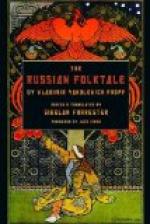These bits of philosophy often become compressed into expressions which to-day we recognize as proverbs. The words of the Mother Duck, “Into the water he goes if I have to kick him in,” became a Scandinavian proverb. “A little bird told it,” a common saying of to-day, appears in Andersen’s Nightingale and in Thumbelina. But this saying is traceable at least to the third story of the fourth night in Straparola, translated by Keightley, The Dancing Water, the Singing Apple, and the Beautiful Green Bird, in which the bird tells the King that his three guests are his own children. “Even a cat may look at a king,” is probably traceable to some fairy tale if not to Puss-in-Boots. The philosophy in the fairy tales and the proverbs that have arisen in them, are subjects which offer to the adult much pleasure and fruitfulness.
But one must ask, “Does this philosophy appeal to the child? Is it not adult wisdom foreign to his immaturity?” The old folk-tales are the products of adult minds; but the adults were grown-ups that looked upon the world with the eyes of children, and their philosophy often was the philosophy of childhood. For childhood has its philosophy; but because it meets with repression on so many sides it usually keeps it to itself. When given freedom and self-activity and self-expression, the child’s philosophy appears also. And it is the inner truth of the tale rather than the outer forms of sense and shapes of beauty which, when suited to the little child, appeals to this child-philosophy and makes the deepest impression upon him.
In the literary fairy tale there often appears a philosophy which is didactic and above and beyond the child’s knowledge of the world. It remains a question how much this adult philosophy appeals to him. Although his tales were written for his grandchildren, so finished a telling of the tale as we find in Laboulaye, with its delightful hits of satire, appeals more to the grown-up versed in the ways of the world. But the sage remarks of worldly wisdom of Uncle Remus could not fail to impress a little boy: “Go where you will and when you may, and stay long ez you choosen ter stay, en right dar en den you’ll sholy fin’ dat folks what git full er consate en proudness is gwine ter git it tuck out ’m




